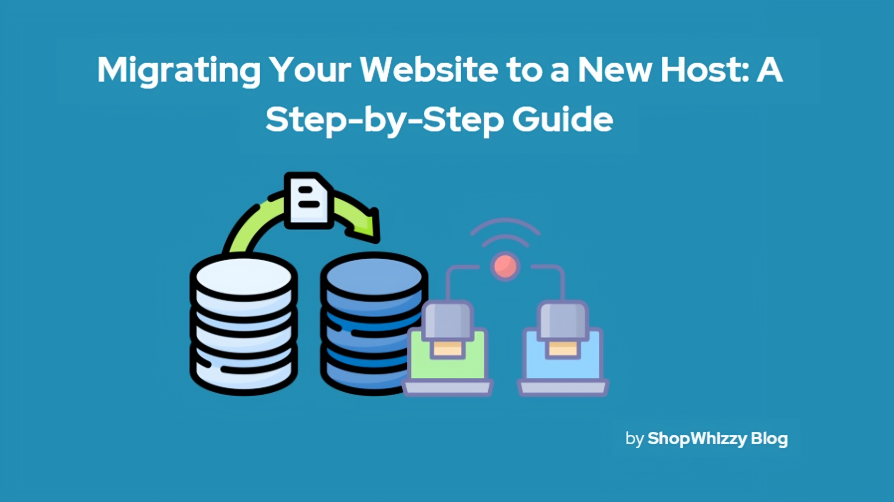Migrating Your Website to a New Host: A Step-by-Step Guide
-

- Blog
- Jun 12, 2024
-
2views
- Reading time: 5 minutes

Understanding Different Types of Hosting Services
Before embarking on the migration journey, it's crucial to have a deep understanding of the various types of hosting services available and their implications for your website.
Overview of Shared, VPS, Dedicated, and Cloud Hosting
-
Shared Hosting: Ideal for small websites with limited traffic and resources, where multiple websites share a single server.
-
VPS Hosting (Virtual Private Server): Offers more control and resources compared to shared hosting, with a virtualized server environment partitioned into multiple virtual servers.
-
Dedicated Hosting: Provides exclusive use of an entire physical server, offering unparalleled performance and customization options.
-
Cloud Hosting: Utilizes a network of virtual servers to deliver scalable and flexible hosting solutions, ideal for websites experiencing fluctuating traffic and resource demands.
Security Implications of Each Hosting Type
Security should be a top priority when selecting a hosting provider. Each hosting type comes with its own set of security implications that must be carefully evaluated.
-
Shared Hosting: Shared hosting environments are more susceptible to security risks due to the shared nature of resources. Security measures such as isolation between accounts and robust account management policies are crucial.
-
VPS Hosting: While VPS hosting offers greater isolation and control compared to shared hosting, it still requires diligent security measures to prevent unauthorized access and ensure data integrity.
-
Dedicated Hosting: Dedicated servers provide the highest level of security since they are entirely dedicated to a single user. However, it's essential to implement stringent security protocols to safeguard against potential vulnerabilities.
-
Cloud Hosting: Cloud hosting offers scalability and redundancy, but it also introduces unique security challenges, such as data breaches and misconfigurations. Implementing strong encryption, access controls, and regular audits is essential.
Key Security Features to Look for in a Hosting Provider
Selecting a hosting provider with robust security features is paramount to protect your website and sensitive data from cyber threats.
Importance of SSL Certificates, Firewalls, DDoS Protection, and Malware Scanning
-
SSL Certificates: Encrypts data exchanged between a user's browser and your website's server, protecting sensitive information and establishing trust with visitors.
-
Firewalls: Acts as a barrier between your website and potential attackers, monitoring traffic and blocking malicious activities.
-
DDoS Protection: Detects and mitigates DDoS attacks in real-time, ensuring uninterrupted access to your website for legitimate users.
-
Malware Scanning: Regularly scans your website's files and databases for malicious code, preventing data breaches and maintaining user trust.
Role of Automated Backups and Disaster Recovery Plans
-
Automated Backups: Creates regular copies of your website's data to ensure recovery in case of data loss or corruption.
-
Disaster Recovery Plans: Outlines procedures for responding to and recovering from catastrophic events, minimizing downtime and preserving operations.
Evaluating the Security Infrastructure of Hosting Providers
When evaluating the security infrastructure of hosting providers, it's critical to thoroughly assess several key components.
How to Assess Data Center Security
-
Verify access controls, such as biometric scanners and access cards, to restrict entry to authorized personnel only.
-
Evaluate surveillance systems like CCTV cameras and motion sensors to monitor the premises.
-
Scrutinize environmental controls, including temperature and humidity monitoring systems, fire suppression systems, and backup power generators.
Reputation and Reliability of Hosting Providers
Researching the reputation and reliability of hosting providers is crucial to ensure uninterrupted service and support.
Researching a Provider’s Track Record and Customer Reviews
-
Read customer testimonials and reviews to gauge reliability, customer support quality, and overall user experience.
-
Consider the volume and sentiment of reviews across various platforms to understand the provider's industry reputation.
Data Privacy and Legal Compliance
Ensuring compliance with data privacy regulations is essential to protect sensitive information and maintain trust with your users.
Ensuring the Hosting Provider Complies with GDPR, HIPAA, and Other Relevant Regulations
-
Review the hosting provider's privacy policy and terms of service for data protection principles and regulatory compliance.
-
Inquire about measures implemented to adhere to GDPR, HIPAA, or other relevant regulations, such as encryption protocols and access controls.
-
Request documentation or certifications validating the provider's compliance efforts, such as GDPR Data Processing Agreements or HIPAA Business Associate Agreements.
Understanding Data Sovereignty and the Implications for Your Business
Consider the location of the hosting provider's data centers and how it aligns with data sovereignty requirements relevant to your operations.
Customer Support and Incident Response
Responsive and reliable customer support is crucial, especially during migration and emergencies.
Evaluating the Quality and Availability of Customer Support
-
Prioritize providers that offer 24/7 customer support via multiple channels, including live chat, email, phone, and ticketing systems.
-
Ensure support staff are knowledgeable and responsive to technical issues, inquiries, or emergencies.
Importance of Having a Robust Incident Response Plan
A well-defined incident response plan is essential for hosting providers to address security incidents effectively and minimize downtime.
Cost vs. Security: Finding the Right Balance
Balancing budget constraints with the need for robust security is a critical consideration for businesses of all sizes.
Understanding the Cost Implications of Enhanced Security Features
Conduct a comprehensive assessment of the expenses associated with implementing additional security measures compared to potential risks and losses from security breaches.
How to Balance Budget Constraints with the Need for Robust Security
-
Select hosting providers with scalable pricing plans and customizable security solutions tailored to your budget and security requirements.
-
Look for providers that offer flexible pricing models, allowing you to scale resources and security features as needed.
Future-Proofing Your Hosting Solution
Scalability and adaptability are key factors to consider when choosing a hosting provider to accommodate future growth and evolving security needs.
Considering Scalability and Future Security Needs
Choose a hosting provider that offers scalable infrastructure and security solutions to support your website's growth and address future security challenges effectively.
How to Choose a Provider That Can Grow with Your Business
Select a provider with a proven history of innovation and a commitment to integrating new technologies and enhancing security measures to support your business's growth.
Conclusion
Migrating your website to a new host is a strategic decision that requires careful planning, thorough research, and a solid understanding of your website's requirements and security considerations. By following this step-by-step guide and partnering with a reputable hosting provider, you can ensure a smooth transition while enhancing your website's performance, security, and reliability.
